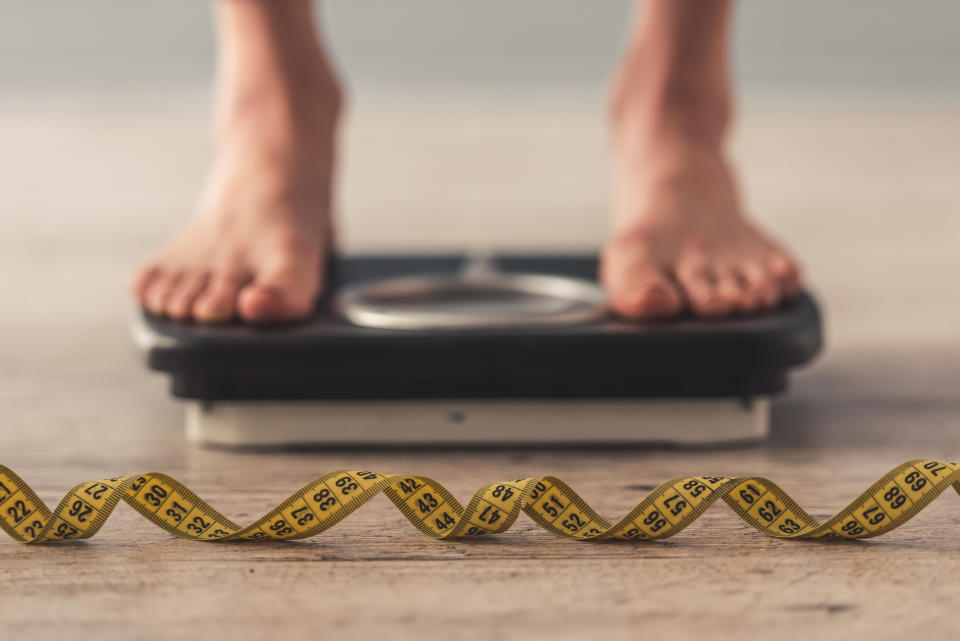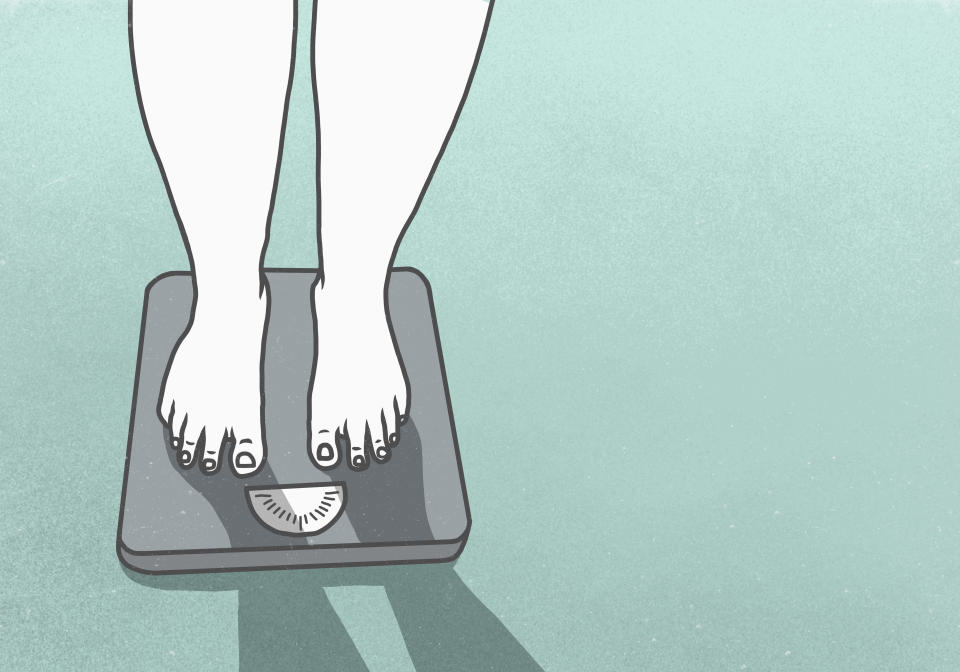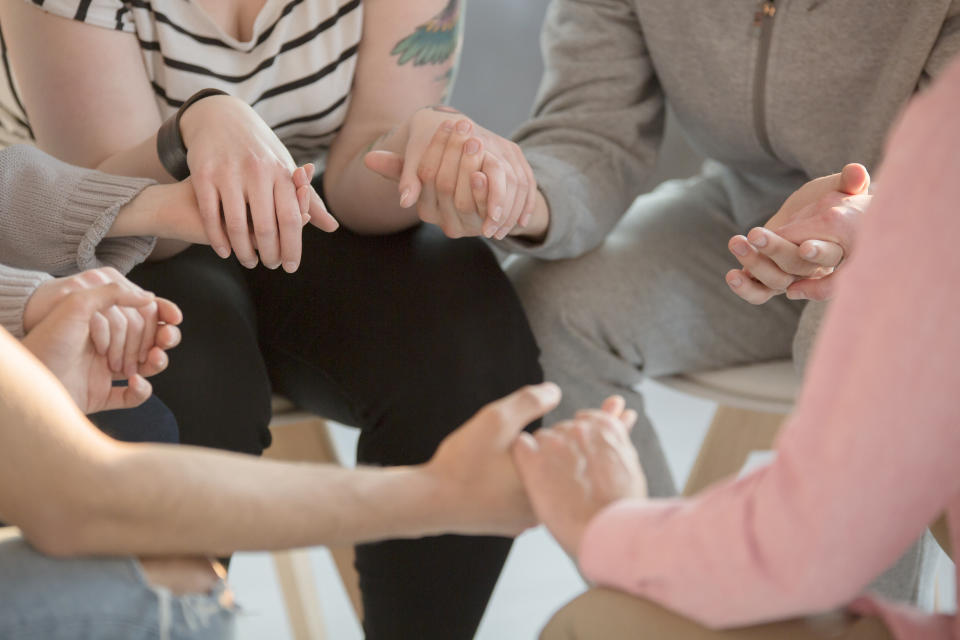While promoting body positivity, I was silently struggling

Introducing EveryBody, a series by Yahoo Canada highlighting the people and organizations working to end weight stigma, promote size inclusivity and prove that everybody and every body has value.
For the past 10 months, I have been working on EveryBody, a series exploring body positivity, fatphobia and social media. I have spent countless hours researching and interviewing every healthcare professional and social media influencer who would speak with me to better understand the complex issues that prevent size inclusion and acceptance. Unfortunately, through all of this, I have also been managing my first eating disorder relapse in almost a decade.
ALSO SEE: What now? Making sense of body positivity in a fatphobic world
I was first diagnosed with anorexia when I was nine, and later diagnosed with bulimia in my teens. But it wasn’t until I was in my 20s that I finally felt as though I had a handle on things. I was eating foods that were “off limits,” able to eat meals without purging or abusing laxatives and my weight was, for all intents and purposes, considered “normal.” I attributed my eating disorder as a thing of the past; a part of my life that I would look back on as perhaps nothing more than a phase of adolescence. But there I was, months away from my 32nd birthday, feeling like I was back where I started.

I would sit in meetings with doctors and authors who spoke passionately about diet culture, feeling a tremendous amount of shame. The hypocrisy weighed on me; it felt as though my life had been completely cut in half. There was the public me, who looked happy and talked passionately about self-acceptance but all the while, I couldn’t stop thinking about the weight I felt like needed to lose, and how much I hated myself for it. At one point, I went and visited the eating disorder program at McMaster Children’s Hospital to discuss how the program has changed and evolved in the fifteen years since I was a patient. I felt uneasy, taking in the familiar room with the looming scale and motivational posters knowing that I wasn’t the “success” story for the program that I pretended to be. By all accounts, I looked healthy. My weight was considered “normal,” my routine and responsibilities weren’t being disrupted by my behaviour, but there had been a significant shift into bulimia that I couldn’t snap out of.
ALSO SEE: 'We should be proud of our size': How this beauty influencer became a fashion industry changemaker
Relapses in eating disorders are often linked to major life stressors such as moving to a new city, changing jobs, financial hardships or death of a loved one. My relapse came during a period of time where I lost all four of my grandparents in just under two years. I had never experienced that level of grief before. Losing the people who I had lived with and who had helped raise me as surrogate parents completely wrecked me and I couldn’t handle the constant wave of emotions. Every time I felt as though I was coping or regaining my footing, I would lose another person and the entire cycle of grief would reset. I was struggling to maintain some sense of control and went back to the only thing I knew how to control: my weight.
I wish I could say that the first time I fell back into old patterns and behaviours, I immediately reached out for help but I didn’t. I was ashamed but at the same time, hopeful that if I just kept going and lost weight, things would get better. All logic went out the window. Despite reading daily the negative impact of weight cycling and that people with bulimia tended to gain weight, I was consumed by the safety of these old patterns, no matter how awful they made me feel.

Within a few months, my throat and neck felt like they were on fire. I visited my doctor, thinking I had strep throat but learned that the pain was likely caused by stomach acid from frequent vomiting. When my doctor suggested I be referred back into a treatment program, I shut down. I assured her that I was fine, that everything was under control while little cartoon clouds of dust formed at my feet as I all but ran out of the office. I was afraid of the long term effects on my stomach, throat and teeth, but I wasn’t ready to give up. I still thought that if I could lose just a little more weight, I would stop.
Soon, I began having nightmares that I was eating or had eaten food without purging. One night, I woke up to find myself standing on my scale in the dark, half dreaming, half hallucinating as the numbers on the scale seemed to dance. They jumped up 10 lbs, down 10 lbs; up 25 lbs, down 25 lbs. Awake or asleep, there was no respite from my obsession with weight.
ALSO SEE: 'It was time to stop hiding': How shaving her head helped this blogger embrace her 'inner warrior'
Part of the problem many people face when recovering from an eating disorder is the lack of access to specialized care. Treatment programs often come with an extensive wait list, where medical professionals must evaluate whether or not someone is “sick enough” to be accepted as a patient. Despite having the highest mortality rate of any other mental health issue, the lack of resources for government funded eating disorder treatment programs means doctors are forced to make difficult decisions based on patient referrals and applications. Often times, this means prioritizing prospective patients with visible, physical symptoms such as low body weight over those whose body weight is considered “normal” or “overweight” but are suffering from eating disorders such as anorexia, bulimia or binge eating disorder.

Although one in 10 people with an eating disorder will die from their disorder, the Canadian government has been slow to acknowledge the specific challenges that people with eating disorders face. Eating disorders are largely excluded from conversation surrounding mental health despite there being an estimated one million Canadians and counting who meet the diagnostic criteria for an eating disorder. A 2014 study found that on average, doctors receive five hours or less of specialized eating disorder training in medical school. The lack of funding the field receives deters physicians from specializing in the field. Eating disorder research in Canada receives only $2.41 per affected person compared to $103.31 per individual with schizophrenia and $462.14 per individual with autism. The consequences of lack of funding are staggering and far reaching. Of the 4,100 psychiatrists in Ontario, only 12 specialize in eating disorder care. This means that not only are Canadians not receiving treatment from government funding programs, the treatment they receive from community not-for-profit groups or out-of-pocket private care, is still not lead by a professional with adequate eating disorder training.
The economic consequences for the lack of eating disorder care in Canada is staggering. According to a 2003 study, the amount of people living with anorexia nervosa on long-term disability cost the province of British Columbia an estimated $101.7 million per year, 30 times the cost of all provincial services specializing in eating disorders. The lack of access to specialized care has forced many Canadians to travel abroad for help. In 2015, a report cited that Canadian taxpayers pay approximately $20 million per year to send fellow Canadians with eating disorders to the United States for treatment.

I finally asked for help in June during a particularly stressful morning before work. My bulimia was in full swing for the day and it wasn’t even 6:30 a.m.. I woke up my boyfriend and laid it out on the table. I admitted to months of hiding my relapse. Even though I was relieved to no longer be lying about my eating disorder, I felt ashamed that I was still consumed by food and despite hurting myself, I didn’t “look sick.” I felt like a failure exposed — I had failed at recovery just as I had failed at my eating disorder.
Like the 82% of people with eating disorders who require treatment, I opted to avoid lengthy wait times for treatment programs and paid for private therapy out of pocket. I began working through a plan with my psychologist to help me curb the amount of self-checks I did each day, strategies to avoid binging and purging and coping skills to help me deal with the underlying grief and anxiety that had served as a catalyst to the relapse.
ALSO SEE: 'We're still stuck': Why online 'body positivity' is holding us back
To help supplement my treatment, I tried attending a free eating disorder support group in Toronto. I was surrounded by women who like me, were desperate for recovery but forced to adhere to the rules of the group which prohibited talk of eating disorder history and symptoms. Instead of talking about the specifics of our lives and our struggles, we had to choose our words very carefully to get to the underlying issues of anxiety and stress. I understood that group therapy isn’t meant to foster comparison, share tips or fuel the disorder further, but I was still struck by the thought: what if this was the only form of treatment that I could get? What if I couldn’t afford private care and medication? Would I ever get better if I couldn’t even talk about myself?

Now more than ever before, there seems to be hope that the country will not only recognize eating disorders as the legitimate mental health issue they are, but as one that requires resources and funding. In early November 2019, four of the country’s leading eating disorder awareness and prevention organization joined forces to publish the Canadian National Eating Disorders Strategy; a compendium of 50 recommendations to improve the quality of eating disorder care across Canada. In 2016 and 2017, the Canadian government pledged to invest $11.5 billion over 10 years to improve home care and mental health initiatives across the country. The newly published strategy targets six pillars, prevention, public education and awareness, treatment, caregiver support, training and research with the hopes of utilizing the government’s commitment to create meaningful change specifically for eating disorder treatment.
I never could have imagined that this series would coincide with an eating disorder relapse. I wanted this series to challenge people, I just didn’t think it would be challenging for me. I am still working towards recovery, and although progress is slow, I know that it’s possible. I’m still working to manage my anxiety, depression and my underlying grief, but I’m hopeful that since I’ve lived in recovery once, I can live in recovery again.

One of the biggest lessons I’ve learned throughout this series is not to judge someone else’s relationship with their body. You never know based on someone’s appearance how they feel about themselves or how “healthy” they actually are - mentally or physically. Whether you want to lose weight or gain weight, love or hate your body, body positivity is all about making peace with yourself and the body you have now. Everybody and every body is a work in progress.
For more information on eating disorders or to find a treatment provider near you, visit the National Eating Disorder Information Centre (NEDIC) or the National Eating Disorder Association (NEDA) for information outside of Canada.
Let us know what you think by commenting below and tweeting @YahooStyleCA! Follow us on Twitter and Instagram.



